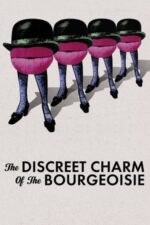Beyond the Mansions: Exploring Cinema's Take on the Bourgeoisie
Okay, let’s talk about something fascinating – the bourgeoisie. Now, that term can feel a bit academic, conjuring images of stuffy drawing rooms and inherited wealth. But in film, it becomes so much more than just a social class; it's a lens through which we examine societal structures, anxieties, and even ourselves. It’s about power, privilege, and the often-fragile facade of respectability.
Think about Calladita (Ana). On the surface, it’s a story about a young woman seeking opportunity in Spain. But really, it's a pointed look at the disconnect between Ana’s working-class reality and the opulent world she enters as a maid for a wealthy family. It highlights that inherent power imbalance – the reliance on invisible labor that allows this lifestyle to exist. It’s not about demonizing these families, necessarily, but forcing us to confront how their comfort is maintained.
And that's something filmmakers have been doing for decades! Jean Renoir’s Boudu Saved from Drowning is a brilliant example of early satire. The sheer chaos Boudu unleashes on the Lestingois household isn’t just funny; it’s a commentary on the rigidity and artificiality of bourgeois life. It's like watching someone deliberately poking holes in a perfectly constructed balloon – you know, that feeling when you see someone disrupt an overly formal setting? Chef’s Kiss.
But the exploration gets even more complex. Men and Women, for instance, uses the backdrop of prostitution to expose the emptiness lurking beneath the surface of seemingly sophisticated lives. These characters aren't necessarily wealthy in a traditional sense, but they participate in a system that reinforces social hierarchies and exploits vulnerability. It’s uncomfortable, yes, but it forces us to ask: what are these people really searching for?
Even films like Katzelmacher, which seem more focused on everyday life, subtly touch upon the anxieties of a community facing change and the potential disruption of established norms – a classic bourgeois fear. And then you have something playful like She Does Not Drink, Smoke or Flirt But… She Talks. It’s less about class critique and more about how gossip, often fueled by boredom and a desire for connection within these circles, can become a weapon.
The bourgeoisie isn't just about money; it's about values, expectations, and the performance of belonging. It's a target ripe for satire, a mirror reflecting our own societal anxieties, and a fascinating subject for filmmakers to dissect. So next time you’re looking for something thought-provoking, consider films that delve into this world – you might be surprised by what you discover about yourself along the way.
What do you think? Any other films that come to mind when you think of exploring the bourgeoisie on screen?







































